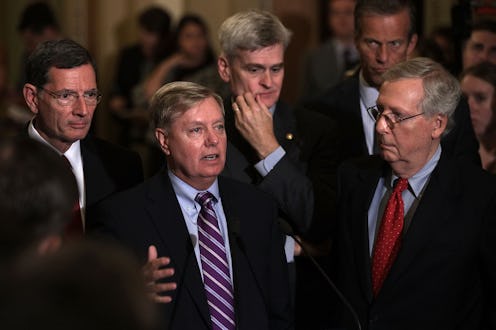News
Medicaid Directors From All 50 States Fiercely Reject Graham-Cassidy

The Republicans' latest effort to repeal Obamacare has received intense opposition from the very insurance companies, hospitals, and health care providers that it would affect. Last week, Sens. Bill Cassidy and Lindsey Graham introduced an amendment to the bill that would "repeal the structure and architecture of Obamacare and replace it with a block grant given annually to states." On Thursday evening, in yet another blow to the Graham-Cassidy bill, Medicaid directors from all 50 states signed a letter warning that it would "fail to deliver on our collective goal of an improved health care system."
The National Association of Medicaid Directors (NAMD), the coalition representing the Medicaid directors from all 50 states, said in a statement that the GOP bill would place a massive burden on the states if passed. Graham-Cassidy would largely dismantle most of the Affordable Care Act and refashion the Medicaid program, which accounts for 25 percent of the average state budget, by shrinking the budget for federal health care programs and turning the rest of the money over to the states. Federal money devoted to Medicaid and private insurance would shrink by $215 million between 2020 and 2026, according to an analysis by Avalere Health, and more than half of the cuts in legislation would come from Medicaid.
Graham-Cassidy would force states to reorganize their own health care systems by 2020 when the Affordable Care Act would expire. Medicaid directors cautioned in their letter that it would be the "the largest intergovernmental transfer of financial risk from the federal government to the states in our country's history." NAMD wrote:
The scope of this work, and the resources required to support state planning and implementation activities, cannot be overstated. States will need to develop overall strategies, invest in infrastructure development, systems changes, provider and managed care plan contracting, and perform a host of other activities. The vast majority of states will not be able to do so within the two-year timeframe envisioned here, especially considering the apparent lack of federal funding in the bill to support these critical activities.
NAMD emphasized the huge amount of work and resources that would need to go into restructuring entire health care systems in two years, saying that "the vast majority of states will not be able to do so within the two-year timeframe envisioned here, especially considering the apparent lack of federal funding in the bill to support these critical activities."
The NAMD statement also criticized Graham-Cassidy’s lack of a Congressional Budget Office score, an analysis of the likely effects of proposed legislation on the federal budget, before Republicans vote on the bill on Sept. 30. “Any effort of this magnitude needs thorough discussion, examination and analysis, and should not be rushed through without proper deliberation,” NAMD’s letter reads in part. “The legislative proposal would not even have a full CBO score until after its scheduled passage, which should be the bare minimum required for beginning consideration.”
If passed, Graham-Cassidy would cause 34 states to lose federal spending on health insurance, and states like California and New York with more expensive medicine and large benefits to lower-income residents would lose billions of dollars, according to The Washington Post.
Although Graham-Cassidy would technically still keep the regulation under Obamacare that forbids insurance companies from denying patients based on pre-existing conditions, the bill would give states the choice to remove the requirement that makes insurance cost the same for all patients regardless of health status. Those with pre-existing conditions would be at risk should insurance companies decide to charge higher prices for coverage.
Andy Slavitt, former acting administrator of the Centers for Medicare and Medicaid Service under President Obama, pointed out the unprecedented nature of this move by the bipartisan group. He wrote on Twitter that it was "very unusual" when they "usually defer to the govs."
Connecticut Sen. Chris Murphy also tweeted on Thursday evening that having unanimous opposition from the group was "Bananas." He added: "You couldn't get ALL 50 state Medicaid directors to agree any anything else in health care policy."
A vote will most likely take place next week, according to the office of Senate Majority Leader Mitch McConnell. Graham-Cassidy will need at least 50 votes to pass, and the opposition to it is only growing louder.